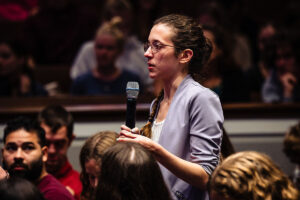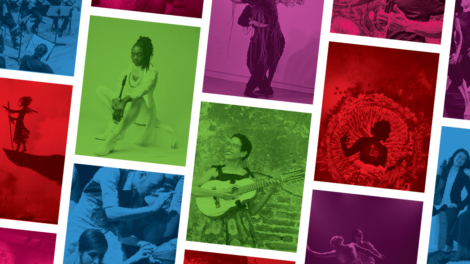Daveed Diggs shares passion for education, performing arts with the Lafayette community
By Margaret Wilson; Contributing reporting by Madeline Marriott ’24

Photo by Ari Michelson
On Tuesday, Sept. 24, Daveed Diggs, the renowned actor, writer, and producer, visited Lafayette College to share his passion for education, creativity, and the performing arts. Starting his day with a visit to a theater class, where he engaged with students and faculty, Diggs concluded it with a public Q&A with President Nicole Hurd and filmmaker Jaye Fenderson of Three Frame Media. Among the topics was the upcoming docuseries The Class, which Diggs and President Hurd executive produced together. The Class follows high school students during the COVID-19 pandemic, shining a light on the struggles of shutdowns and the importance of student opportunity. The series will air on PBS in spring 2025.
Diggs also met with more than 80 student-athletes on the track and field and cross country teams, and enjoyed musical performances by Lafayette students.
Here’s a glimpse into Diggs’ time on campus:
From inside the classroom
Besides the award-winning role as Marquis de Lafayette/Thomas Jefferson in the hit Broadway musical Hamilton that brought him national acclaim, the accomplished actor is a singer-songwriter, producer, and film writer. He shared his knowledge of the performing arts directly with Lafayette students.
Diggs visited “Theater and Social Justice,” a First-Year Seminar in the Theater Department taught by Prof. Mary Jo Lodge. The course combines performance, writing, and discussion to investigate the role that theater plays in social change.
During the class, held in Lafayette’s Studio Theater, Diggs spoke to two dozen students about his start in the theater and music industries, and how his favorite experiences during his run in Hamilton were the ones outside of the stage. This included endeavors like the Hamilton Education Program, which brings the show and its history directly to grades 6-12 in the community.
Engaging with students on the topic of building a performing career, Diggs made sure to emphasize how the role of “artist” stays with a person, regardless of their job.
“I’ve never needed a job to feel like an artist,” Diggs said. “No one can tell you if you’re an artist or not. That has always been useful for me to fall back on.”
Diggs also spoke about the role of the arts in public life, tying into the course curriculum. During the dialogue, students were able to share their experiences with the intersection of theater and social justice.
His visit made an impression. “I was so excited to take this class because it’s such an interesting way to look at theater, and it makes you feel like theater is important. Getting to have a partnership with someone like Diggs, who knows a lot about it and uses theater for social justice through Hamilton and his other work, is really cool, and we can see what kind of opportunities we might have in the future,” Jack Finegold ’28 said.
Marisa Carroll ’25, who served on the executive board of the Marquis Players during last spring’s production of Cabaret and saw the impact of socially relevant themes within performance firsthand, was deeply impacted by the opportunity to speak directly with Diggs.
“Having Daveed Diggs come in really shows that what we’re doing is meaningful and does impact people,” Carroll said. “For me, if I ever do go on to do more [theater] outside of college, all of this will really stay with me and help me use my voice to serve the community.”
Sharing The Class and beyond
Diggs, President Hurd, and Fenderson were introduced to a packed house in Colton Chapel by Thania Hernandez ’25, student government president. During their time, the trio shared the inspiration behind The Class, as well as their thoughts on how education impacts a student’s life.






















Attendees were afforded a sneak peek into the series, the first time it’s been shown in public. In an eight-minute clip, viewers were introduced to Mr. Cam, an adviser working with College Advising Corps, an organization founded by President Hurd that places recent college graduates in under-resourced high schools to serve as peer mentors on the college application process.
The story follows his work with students at his alma mater, Deer Valley High School in Antioch, Calif., as they face not only such struggles as housing insecurity and financial need going into the college application process, but also a global pandemic during their senior year.
In speaking about the series, Fenderson pointed out that The Class followed students in the high school class of 2021, the same class as today’s Lafayette seniors. The project not only chronicles their trials and tribulations when applying for college, but the sense of loss and disconnectedness that comes with giving up many of their senior year activities.
“This turned into an incredible time capsule of something we all lived through,” Diggs said. “It was unprecedented, the experiences you all gave up, and the fact that you’re all in college right now wasn’t a given. To watch these students still focus on getting these things done—I found that really powerful and inspirational.”
The three speakers also discussed their approach to making art, covering topics such as how to weave social justice themes into their projects, continuing to find what they’re passionate about every day, and the benefit of living a life that doesn’t follow a linear path.
“The day you stop being curious, the day you stop trying to figure out what your passion is—that’s it,” President Hurd said. “That [curiosity] is what it’s all about.”
Diggs continued to hammer home the importance of Lafayette students appreciating where they are, both philosophically and physically. Having had the opportunity to explore the campus that day, Diggs highlighted the opportunities that exist for Lafayette students to make a difference.
“You are a very strong generation of people … that gives me great hope. You do it with incredible style and flair, and you’ve already overcome a lot,” Diggs said. “The theories you’re learning while you’re here, that’s all great, but it’s just theory. It becomes practice when you filter it through your particular lens, and that’s what changes the world.”

